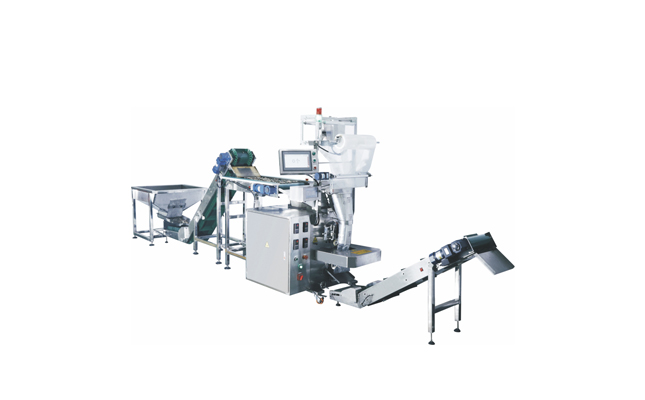
Date | 2023-05-15 16:26:39
Package machinery plays a vital role in various industries, facilitating the efficient and cost-effective packaging of products. With advancements in technology, these machines have become increasingly sophisticated, delivering enhanced productivity and ensuring high-quality packaging solutions. In this article, we will delve into the world of package machinery, exploring its types, functions, and the benefits it offers to businesses.
Types of Package Machinery
Filling Machines: Filling machines are designed to accurately dispense liquids, powders, or granules into containers. Whether it's bottling beverages, filling bags with snacks, or packaging pharmaceutical products, filling machines ensure precise and consistent measurements, minimizing wastage and optimizing production speed.
Sealing Machines: Sealing machines are used to create airtight seals on packages, preventing spoilage, contamination, and damage during transportation. These machines employ various techniques, such as heat sealing, induction sealing, or ultrasonic sealing, depending on the packaging materials and requirements.
Wrapping Machines: Wrapping machines are utilized to securely enclose products in protective materials like shrink wrap, stretch film, or foil. They are commonly used in the food industry to preserve freshness, extend shelf life, and maintain product integrity.
Labeling Machines: Labeling machines automate the process of applying labels to products, containers, or packaging materials. They ensure accurate placement and alignment of labels, improving overall packaging aesthetics and enabling efficient inventory management.
Functions and Benefits
Improved Efficiency: Package machinery significantly enhances the speed and accuracy of packaging processes. By automating tasks that were previously done manually, these machines streamline production lines, reduce labor costs, and eliminate human errors.
Consistency and Quality: With precise measurements and standardized operations, package machinery ensures consistent packaging quality, regardless of the operator. This consistency is crucial for maintaining brand integrity, complying with industry regulations, and meeting customer expectations.
Increased Output: Package machinery allows businesses to meet high-volume demands by increasing production output. The machines' high-speed capabilities, coupled with their ability to work continuously, enable companies to package larger quantities of products within shorter timeframes.
Cost Savings: Although package machinery requires an initial investment, it offers long-term cost savings. By reducing material waste, minimizing rework, and optimizing labor utilization, these machines improve overall operational efficiency and contribute to higher profitability.
Flexibility and Adaptability: Package machinery can be customized to accommodate various product types, sizes, and packaging formats. This versatility allows businesses to adapt to market trends, launch new products, and cater to diverse customer preferences without major disruptions to their packaging processes.
Conclusion
Package machinery revolutionizes the packaging industry by combining precision, efficiency, and flexibility. With their ability to perform complex tasks quickly and consistently, these machines contribute to increased productivity, improved product quality, and reduced costs. Embracing package machinery technology empowers businesses to stay competitive in today's fast-paced market, ensuring that their products reach consumers in optimal condition while driving overall success.Title: Innovations in Package Machinery: Revolutionizing the Packaging Industry
Introduction
The packaging industry is undergoing a transformative phase, driven by technological advancements in package machinery. These innovations have revolutionized packaging processes, leading to increased efficiency, improved sustainability, and enhanced consumer experiences. In this article, we will explore the latest breakthroughs in package machinery and their significant impact on the packaging industry.
Smart Packaging Machinery
Smart packaging machinery incorporates advanced sensors, artificial intelligence, and machine learning algorithms to optimize packaging operations. These machines can autonomously monitor and adjust packaging parameters, such as fill levels, sealing pressures, and labeling positions, ensuring consistent quality throughout the process. By leveraging real-time data and predictive analytics, smart packaging machinery minimizes downtime, reduces waste, and enhances overall productivity.
Sustainable Packaging Solutions
In response to growing environmental concerns, package machinery manufacturers are developing innovative solutions to promote sustainability. Eco-friendly packaging materials, such as biodegradable films and recyclable substrates, are being seamlessly integrated into packaging machinery. Additionally, energy-efficient components and optimized processes help minimize carbon footprints. By adopting these sustainable packaging solutions, businesses can reduce environmental impact and meet the increasing demand for eco-conscious products.
Robotics and Automation
Robotic systems are increasingly being integrated into package machinery, automating repetitive tasks and improving production efficiency. Robotic arms can handle complex packaging processes, including picking, placing, and palletizing, with precision and speed. These machines excel in high-speed operations, ensuring consistent quality and reducing the risk of human errors. The integration of robotics and automation in package machinery also enhances workplace safety by eliminating the need for manual handling of heavy or hazardous materials.
Intelligent Quality Control
Package machinery now incorporates advanced vision systems and inspection technologies to enable intelligent quality control. High-resolution cameras and image processing algorithms detect defects, such as mislabeled products, damaged packaging, or contaminants, ensuring only flawless items reach the market. This level of quality control not only enhances consumer satisfaction but also helps businesses maintain brand reputation and comply with stringent industry regulations.
Integration with Industry 4.0
Package machinery is increasingly interconnected with other systems through the integration with Industry 4.0 technologies. Internet of Things (IoT) devices and cloud-based platforms enable real-time monitoring, remote diagnostics, and predictive maintenance of packaging machines. This connectivity facilitates data-driven decision-making, optimization of production schedules, and efficient resource allocation. Ultimately, Industry 4.0 integration enhances overall operational efficiency, reduces downtime, and improves the overall performance of package machinery.
Conclusion
The advancements in package machinery are reshaping the packaging industry, offering unprecedented levels of efficiency, sustainability, and quality control. Smart packaging machinery, sustainable solutions, robotics, intelligent quality control, and Industry 4.0 integration are propelling the industry forward, enabling businesses to meet evolving consumer demands while reducing environmental impact. As these technologies continue to evolve, it is crucial for companies to embrace innovation and leverage package machinery to gain a competitive edge in the dynamic world of packaging.
